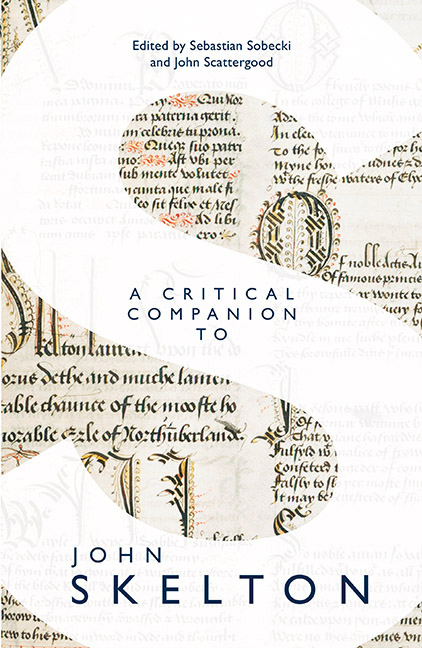Book contents
- Frontmatter
- Dedication
- Contents
- Acknowledgements
- Contributors
- Abbreviations
- Conventions
- Introduction
- 1 John Skelton (?1460–1529): A Life in Writing
- 2 Religion
- 3 Law and Politics
- 4 Classical Literature
- 5 Humanism
- 6 Satires and Invectives
- 7 Lyrics and Short Poems
- 8 Skelton's Voice and Performance
- 9 Literary Tradition
- 10 Skelton and the English Language
- 11 Skelton's English Works in Manuscripts and Print
- 12 Skelton's English Canon
- 13 Reception and Afterlife
- A Skelton Bibliography
- Index of Manuscripts
- Index of Printers and Stationers
- General Index
Introduction
Published online by Cambridge University Press: 24 July 2019
- Frontmatter
- Dedication
- Contents
- Acknowledgements
- Contributors
- Abbreviations
- Conventions
- Introduction
- 1 John Skelton (?1460–1529): A Life in Writing
- 2 Religion
- 3 Law and Politics
- 4 Classical Literature
- 5 Humanism
- 6 Satires and Invectives
- 7 Lyrics and Short Poems
- 8 Skelton's Voice and Performance
- 9 Literary Tradition
- 10 Skelton and the English Language
- 11 Skelton's English Works in Manuscripts and Print
- 12 Skelton's English Canon
- 13 Reception and Afterlife
- A Skelton Bibliography
- Index of Manuscripts
- Index of Printers and Stationers
- General Index
Summary
John Skelton remains challenging for modern audiences. Filled with contradictions, he is a poet in need of a critical introduction. His deep erudition can be daunting: his fondness for Latin interpolations and interjections often produces macaronic lines with a distinctly bookish and even pedantic appearance. Yet Skelton's learned content is often couched in a verse form more readily associated with levity: skeltonics, a convention which he helped to create and, rather eccentrically, also name. This trademark style is characterised by rhyming couplets and short lines, often carrying only two or three stresses, that give his poetry its typically fast pace.
His surviving oeuvre may be modest in size, but his English and Latin poems span a broad gamut of topics, themes and occasions. For a (self-designated) court poet there is remarkably little flattery in his work. Instead, Skelton is perhaps best known for his complex moral allegory, The Bowge of Courte, and his three scathing satires of Henry VIII's despised Chancellor, Cardinal Wolsey: Speke Parott, Collyn Clout and Why Come Ye Nat to Courte? The Bowge of Courte is a biting satire of court life, built around the fashionable allegory of the ship-of-state. Skelton's caustic view of life in the immediate orbit of Henry VIII remains one of the most powerful critiques of the arbitrariness of late medieval and early modern court politics. It is as if The Bowge of Courte had been written to anticipate the tumultuous careers of such Tudor courtiers as Sir Thomas Wyatt or, indeed, Skelton himself. The Wolsey satires, on the other hand, mark a milestone in the history of political satire in Britain. With irreverent wit and unmitigated vitriol these three poems unleashed an attack on England's second-most powerful man that caused Skelton to fear for his own life and to seek refuge in the sanctuary of Westminster. Few satirists in English history have dared to match Skelton's radical commitment to this genre. But Skelton's surviving works also include occasional verse, advice literature and even a play, Magnyfycence. Then there is the specific historical and political context in which almost all of his work is embedded, making some of his poems only fully accessible with the firm support of editorial footnotes. A companion volume to Skelton, therefore, has been long overdue.
- Type
- Chapter
- Information
- A Critical Companion to John Skelton , pp. 1 - 4Publisher: Boydell & BrewerPrint publication year: 2018



